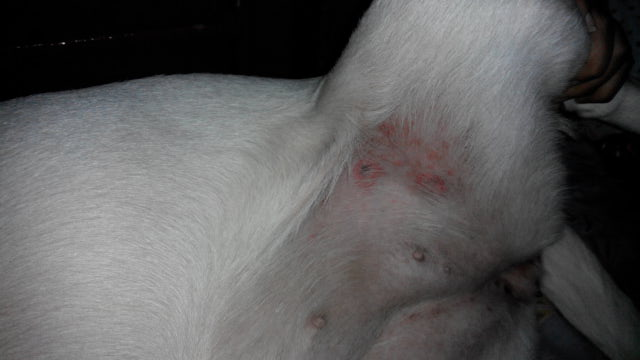Question3yr spayed american eskimo...3 days of severe rectal bleeding, can't hold down water, not eating .. at vets now with IV and anitbiotics... ALT enzyme levels at over 2000 !! (yes 2-thousand)... what is the problem.? vet has no idea w/o biopsy etc. and I don't have the funds for it... is she in liver failure? her fecal test showed no parasites etc... xray came back clean....what can you tell me about this...
AnswerHi Dolores,
ALT is short for "Alanine Transferase". This is an enzyme that is present in the cells in the liver. In order
for it to be found in elevated quantities in the blood stream, liver cells have to be leaking the enzyme.
So rises in this enzyme indicate damage to liver cells sufficient to cause them to leak the enzyme.
Rises in ALT, even large rises, can occur due to problems that don't cause much change in liver function, though. Trauma, liver toxins, blood clots and other insults to the liver which damage a large number of cells in a small area of the liver may produce high rises in ALT that are essentially meaningless, as the liver will recover with no problem. On the other hand, chronic liver diseases that
constantly produce damage to the liver but do so slowly may never cause strong rises in the ALT levels even though liver function is deteriorating significantly. ALT levels may rise or fall fairly rapidly, as the half-life of the enzyme in the blood stream is less than two days.
Very high ALP levels can be seen in dogs with adrenal gland disease.
It would probably be a good idea to get your dog's rectal bleeding under control, and then recheck her enzyme levels.
If paying your vet bill is a problem, try working out a payment schedule with your vet. Another option is applying for a CareCard, a kind of credit card that you can use for veterinary bills. You can read about it here:
http://www.carecredit.com/
You could also ask your veterinarian to submit an assistance request to the American Animal Hospital Association (AAHA) "Helping Pets Fund." In order to qualify, your animal hospital must be AAHA accredited.
IMOM has a veterinary financial assistance fund which you'd have to apply for, you can read about the process here:
http://www.imom.org/fa/
I hope I've been a help.
Best of luck,
Patti

 My 2 yr old blacks eating habits.
Question
Pic of Tula
I have a 2yr old black lab. Her an
My 2 yr old blacks eating habits.
Question
Pic of Tula
I have a 2yr old black lab. Her an
 Growth on dogs right foreleg
Question
Foreleg 1 Foreleg 2
Hi Gary,
Our
Growth on dogs right foreleg
Question
Foreleg 1 Foreleg 2
Hi Gary,
Our
 Puppy wont come!
QuestionCapone & Rascal
QUESTION: Help! &nbs
Puppy wont come!
QuestionCapone & Rascal
QUESTION: Help! &nbs
 What type of do is my dog Abby
Question
Abby Abby
what type of dog is my
What type of do is my dog Abby
Question
Abby Abby
what type of dog is my
 Live worms came out in my dogs poop and he has some rashes?
Question
The Rashes
She is 15 months old and is
Live worms came out in my dogs poop and he has some rashes?
Question
The Rashes
She is 15 months old and is